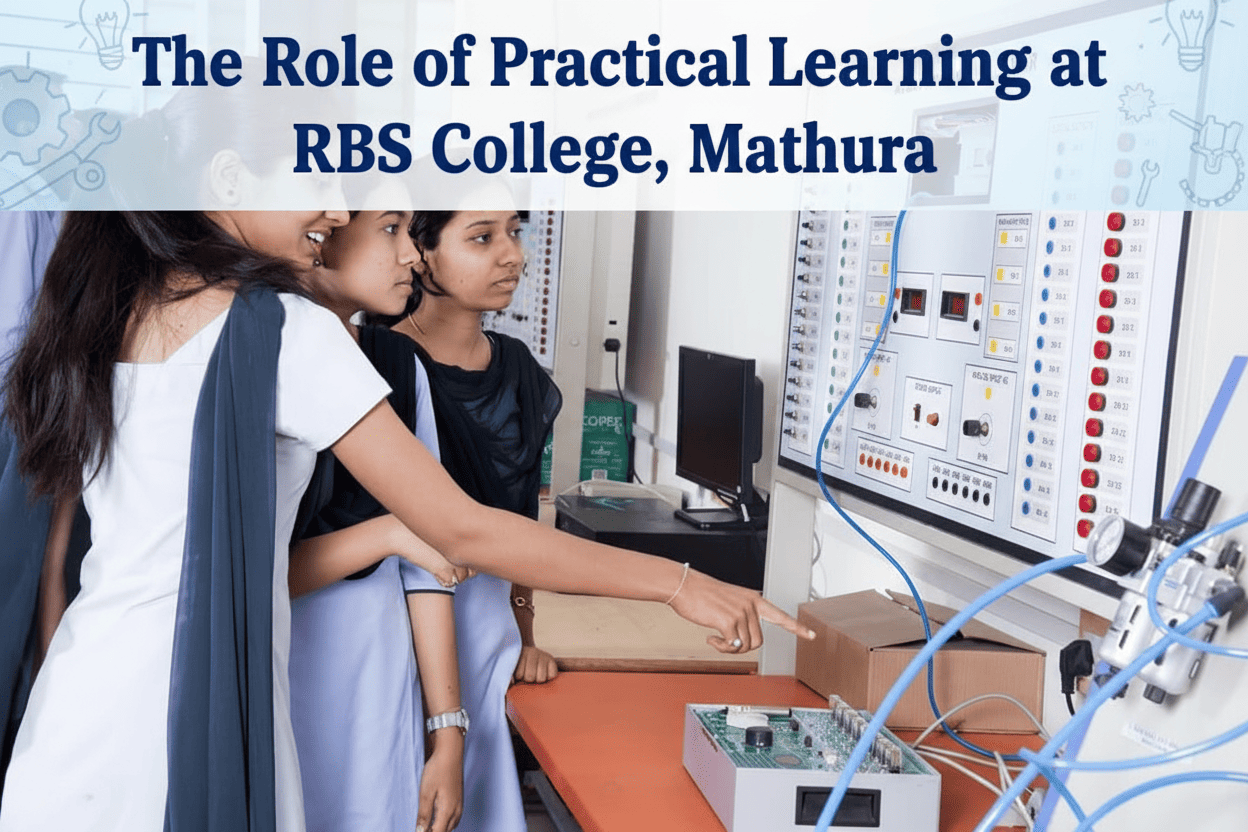-
 Call Now ! +91-9720273789
Call Now ! +91-9720273789 -
 Email Now info@rbscollege.com
Email Now info@rbscollege.com

Education becomes truly meaningful when theory meets practice. At RBS College of Institutions, Mathura, this philosophy is at the heart of every course. Whether it’s a science experiment, a teaching demonstration, or a pharmaceutical formulation, students are encouraged to learn by doing.
The college believes that hands-on learning is the key to building competence, creativity, and confidence — essential qualities for success in any career path.
RBS College combines traditional teaching with innovative, practical learning techniques. While lectures provide a strong theoretical foundation, real-world application through labs, workshops, and projects ensures that students truly understand and retain what they learn.
This balanced approach prepares graduates to adapt, analyze, and excel in professional environments.
The college’s modern infrastructure supports its focus on experiential education. Each department is equipped with dedicated laboratories, research spaces, and demonstration rooms that meet academic and industry standards.
For instance:
B.Sc. students perform advanced experiments in Physics, Chemistry, and Biology labs.
D.Pharma students learn drug formulation, analysis, and testing through practical lab sessions.
B.Ed. and D.El.Ed. trainees practice teaching methodologies in simulated classroom environments.
These facilities create a bridge between academic learning and real-world professional application.
In courses like Bachelor of Science (B.Sc.), practical sessions are a vital part of the curriculum. Students conduct regular experiments, record data, analyze outcomes, and present findings.
Such activities help them:
Develop scientific reasoning
Learn experimental accuracy
Strengthen analytical thinking
Gain confidence in research and problem-solving
These skills not only prepare them for higher education but also open doors to careers in research, technology, and innovation.
For future teachers enrolled in B.Ed. and D.El.Ed. (B.T.C.), classroom knowledge is reinforced through teaching practice and internships. Trainees visit partner schools to deliver lessons, manage classrooms, and design teaching materials under supervision.
This real-world experience helps them:
Understand child psychology and learning styles
Improve communication and leadership skills
Master lesson planning and evaluation methods
By the time they graduate, RBS College trainees are confident, compassionate, and classroom-ready educators.
The Diploma in Pharmacy (D.Pharma) program emphasizes industrial visits, clinical training, and lab-based learning. Students gain firsthand knowledge about drug manufacturing, dispensing, and patient care.
Practical exposure in hospital settings and pharmaceutical industries ensures that graduates are well-prepared for careers as pharmacists, lab technicians, and healthcare professionals.
At RBS College, practical learning extends beyond individual experiments. Students collaborate on group projects, case studies, and field assignments.
This approach enhances:
Teamwork and communication
Leadership and accountability
Real-time problem-solving
Research and innovation mindset
It also nurtures creativity and confidence — traits that help students stand out in competitive professional environments.
The ultimate goal of practical learning at RBS College is to make students industry-ready. Through continuous assessments, internships, and exposure to real-world challenges, students graduate not just with degrees — but with skills employers value.
The college’s focus on application-oriented education ensures that every RBS student can confidently transition from campus to career.
Graduates from RBS College of Institutions, Mathura, are distinguished by their practical knowledge, professionalism, and confidence. Whether they choose teaching, research, healthcare, or business, they bring with them a solid foundation of hands-on experience and ethical values.
By integrating practical learning into every program, RBS College nurtures thinkers, creators, and leaders — not just learners.
Practical learning transforms education into experience — and experience into success. At RBS College, students learn to apply theory to practice, turning academic lessons into real-world achievements.
From laboratories to classrooms, from teaching practice to industrial training, every learning moment at RBS is designed to shape future-ready professionals. This is what makes RBS College of Institutions, Mathura, a true leader in holistic education.